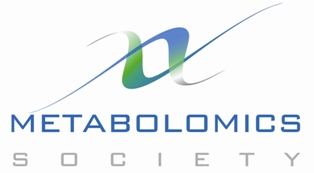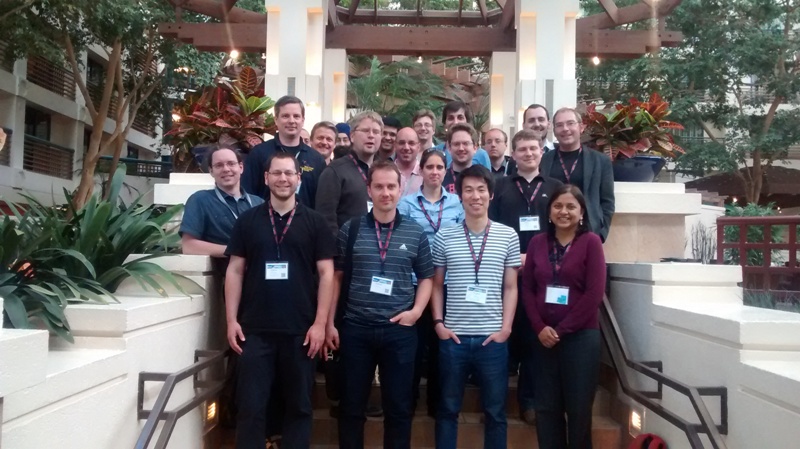
TMIC and the Metabolomics Society
Issue 55 - March 2016
CONTENTS:
Online version of this newsletter:
http://www.metabonews.ca/Mar2016/MetaboNews_Mar2016.htm

 |
| Published
in partnership between TMIC and the Metabolomics Society Issue 55 - March 2016 |
|
CONTENTS: |
|
|
 |
| TMIC
Services |
 |
Metabolomics Society News |

| |
Metabolomics Spotlight
|

| |
MetaboInterview
|
| Program
Officer in the Epidemiology and Genomics Research
Program, Division of Cancer Control and Population
Sciences at the National Cancer Institute, National
Institutes of Health |
|
 |
Biography Krista Zanetti is a Program Officer in the Epidemiology and Genomics Research Program (EGRP), Division of Cancer Control and Population Sciences at the National Cancer Institute (NCI), National Institutes of Health. Dr. Zanetti earned her Ph.D. in Nutrition in 2003 from Cornell University and joined the Cancer Prevention Fellowship Program at the NCI. During the first year of her fellowship, she earned an M.P.H. at the Johns Hopkins Bloomberg School of Public Health. Dr. Zanetti then conducted primary research in the Laboratory of Human Carcinogenesis in the NCI’s Center for Cancer Research from 2004 to 2010. Since joining EGRP in 2010, Dr. Zanetti’s primary focus has been building infrastructure and capacity to support metabolomics in population-based research. Most recently, she spearheaded collaborative efforts to establish the trans-NIH international COnsortium of METabolomics Studies (COMETS) that brought together 25 prospective cohorts and three well-established consortia from the U.S., Europe, Asia, and South America. |
 |
Metabolomics Current Contents
|
 |
MetaboNews |
| 9 Feb
2016 |
ABRF Metabolomics
Research Group Research Study
The ABRF Metabolomics Research Group invites you to participate in its second study with a focus on strategies for the analysis of metabolomics data collected with high resolution mass spectrometry. For study details and materials, please use the following hyperlink: http://bioshare.bioinformatics.ucdavis.edu/bioshare/view/tthvputgo2am4yo/ |
Metabolomics Events
|
| 21-23 Mar 2016 |
Clinical & Pharmaceutical
Solutions through Analysis Make plans to attend the 2nd Annual Metabolomics
Symposium on Clinical & Pharmaceutical Solutions
through Analysis (CPSA Metabolomics 2016). This unique
event is highly interactive and dedicated to the needs
of the clinic. The program features updated
perspectives and experiences on clinical and
pharmaceutical analysis. Imagination and stimulating
discussion are central to each CPSA Metabolomics
session and event. For more information, visit http://www.cpsa-metabolomics.com/2016/index.shtml |
| 28 Mar-1 Apr 2016 |
Hands-on LC-MS Data processing and
Statistics 2016 The course will include:
For more information, visit http://metabolomics.ucdavis.edu/courses-and-seminars/courses |
| 30 Mar to 1 Apr 2016 |
The Australian & New Zealand
Metabolomics Conference (ANZMET 2016) Its aim is to promote collaboration, innovation, and community-building in metabolomics across private and government sectors by open engagement of all researchers and institutions throughout Australia and New Zealand. The conference is actively supported by the Australia & New Zealand Metabolomics Network (ANZMN), in conjunction with the Metabolomics Society and Metabolomics Australia. Several keynote speakers will present at the conference, including Professor David Wishart amongst others.
|
| 3-7 Apr 2016 |
Microscale Separations and
Bioanalysis: MSB 2016 To ensure a stimulating yet intimate environment for discussions, MSB 2016 will be limited to 275 delegates. We invite you to browse our conference website (www.msb2016.org) to learn more about our exciting scientific program. |
| 4-6 Apr 2016 |
Metabolomics with the Q Exactive
For further information and registration details, please visit http://www.birmingham.ac.uk/facilities/metabolomics-training-centre/courses/q-exactive.aspx or contact Dr Cate Winder (C.L.Winder@bham.ac.uk). |
| 17-19 Apr 2016 |
4th Workshop on Holistic Analytical
Methods for Systems Biology Studies We expect again high level presentations and an open, friendly atmosphere. We plan tutorial sessions on protocols, tips and tricks, live demonstration of software, and training session for small number of young participants with hands on PC. The first day is devoted to fundamentals/methods/protocols, the second day to health/life sciences and the last day to food/plant/nutrition. Topics:
Looking forward to seeing you in the historic port city of Thessaloniki. For more information, visit http://bioanalysis.web.auth.gr/metabolomics. |
| 18 Apr to 26 May 2016 |
Copenhagen School of Chemometrics -
2016 (CSC-2016)
How to enroll in the CSC-2016? Please, send an e-mail to Jose Amigo (jmar@food.ku.dk) with the information requested in this flyer. |
| 20-22 Apr 2016 |
Multiple biofluid and tissue types,
from sample preparation to analysis strategies for
metabolomics
|
| 9-12 May 2016 |
Metabolomics Summer Workshop Registration: https://umichumhs.ut1.qualtrics.com/SE/?SID=SV_bPEVDn7I5wSEcwl This workshop is intended for investigators seeking a solid foundation to expand their research using metabolomics. Sessions include:
If you have any questions about the workshop, please contact Terri Ridenour. For more information, visit the MRC2 website. |
| 26-27 May 2016 |
Informatics and Statistics for
Metabolomics (2016) The workshop will cover many topics ranging from understanding metabolomics technologies, data collection and analysis, using pathway databases, performing pathway analysis, conducting univariate and multivariate statistics, working with metabolomic databases and exploring chemical databases. Participants will be given various data sets and short assignments to assist with the learning process. For more information and to register, visit http://bioinformatics.ca/workshops/2016/informatics-and-statistics-metabolomics-2016. |
| 30 May-2 Jun 2016 |
10th conference of the Francophone
Metabolomics and Fluxomics Society (RFMF)
|
| 27-30 Jun 2016 |
Metabolomics 2016 The conference programme will cover all aspects of metabolomics under five broad themes: Metabolomics in Nutrition and Food Research, Metabolomics in Health and Disease, Advancing the Field, Environmental, Plant and Model Organisms. For further details, visit http://metabolomics2016.org. |
| 17-21 Jul 2016 |
4th Annual Workshop on Metabolomics Women, members of under-represented minority groups, and individuals with disabilities are strongly encouraged to apply. The metabolome, in distinction to the other –Omics, provides a better assessment of the exposure to the chemicals of life – it is truly intergenomic providing information on “metabolites” coming from ourselves or the model we’re using, the unique, non-human/mammalian compounds we consume as part of our food, compounds generated by the microorganisms that are part of “us”, and other compounds that are in the environments we live in. If ever precision medicine is able to deliver what is claimed it will, it has to include the metabolome context in which genes and proteins are operating. The themes in this fourth year of the workshop are:
|
| 12-23 Sep 2016 |
2016 International Summer Sessions
in Metabolomics
|
Metabolomics Jobs |
This is a resource for advertising positions in
metabolomics. If you have a job you would like posted in this
newsletter, please email Ian Forsythe (metabolomics.innovation@gmail.com).
Job postings will be carried for a maximum of four issues
(eight weeks) unless the position is filled prior to that
date.
Jobs Offered
| Job Title | Employer | Location | Posted | Closes | Source |
|---|---|---|---|---|---|
| Postdoctoral scholar |
Oregon State University | Corvallis, OR, USA | 26-Feb-2016 | Until filled |
Metabolomics
Society |
| Postdoctoral Fellowship in Metabolomics |
Lund University | Malmö, Sweden |
23-Feb-2016 | |
Lund University |
| Post-doctoral position (18 mo) in
nutritional metabolomics |
INRA | Clermont-Ferrand, France | 21-Feb-2016 | 15-Mar-2016 |
Metabolomics Society |
| Assistant or Associate Professor or
Professor - Food and Nutritional Metabolomics
Computational Biology |
Ohio State University |
Columbus, OH, USA | 16-Feb-2016 | 18-Mar-2016 |
Ohio State University |
| Cornell University Assist./Assoc.
Professor in Plant Metabolomics |
Cornell University | Ithaca, NY, USA | 1-Feb-2016 | Until filled | Metabolomics Society |
| Assistant Professor, Metabolomics |
Auburn University | Auburn, AL, USA | 21-Jan-2016 | Until filled | Metabolomics Society |
| Research associate 3 at the Metabolomics
lab |
University of Miami |
Miami, FL, USA | 12-Jan-2016 | Until filled |
Metabolomics
Society use key word: P00007201 |
| Proteomics and Metabolomics Facility,
Research Associate I |
Colorado State University | Fort Collins, CO, USA | 4-Jan-2016 | Until filled | Metabolomics Society |
| Proteomics and Metabolomics Facility,
Post-doctoral Scientist |
Colorado State University |
Fort Collins, CO, USA | 4-Jan-2016 | Until filled | Metabolomics Society |
|
Ian J. Forsythe Double AB, MSc Editor, MetaboNews Department of
Computing Science
University of Alberta 221 Athabasca Hall Edmonton, AB, T6G 2E8, Canada Email: metabolomics.innovation@gmail.com Website: http://www.metabonews.ca LinkedIn: https://www.linkedin.com/in/ijforsythe Twitter: http://twitter.com/MetaboNews Google+: https://plus.google.com/118323357793551595134 Facebook: http://www.facebook.com/metabonews |
This newsletter is published in
partnership between The Metabolomics Innovation Centre
(TMIC, http://www.metabolomicscentre.ca/) and the Metabolomics
Society (http://www.metabolomicssociety.org)
for the benefit of the worldwide metabolomics
community.
|